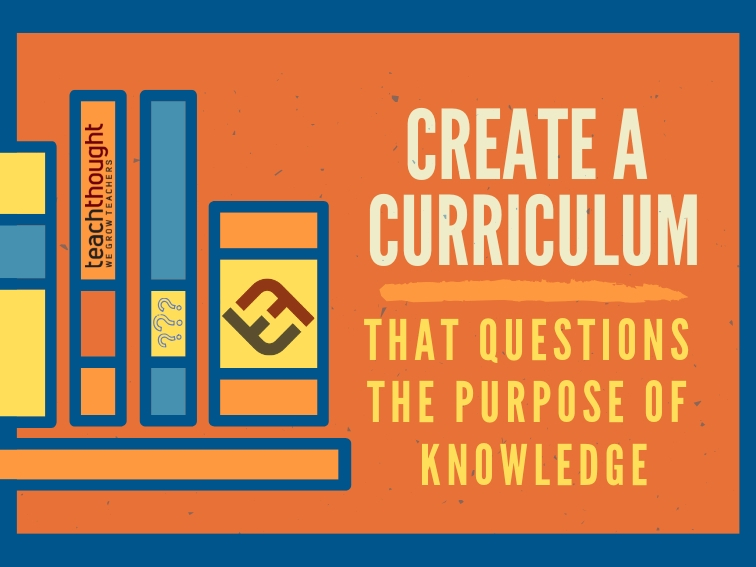
Curriculum That Questions The Purpose Of Knowledge
by Terry Heick
In our recent post, Education’s Curious Fascination With Uniformity, reader James Foss left a useful comment that had within it an interesting concept–the “purpose of knowledge.”
“Is it the standards that dictate curriculum or assessment practices that dictate pedagogy?
It is possible the current standardized model might be a new and improved model over the disparate standards educators have historically developed in their respective communities, at least, as it concerns rigor and the ability to compare each school’s progress (from a certain orientation). However, it is important to underscore Mr. Heick’s point that uniform standards don’t get at the degree of localization that vibrant communities are inclined to favor.
The flavor of ‘local’ found in our curriculum can be enhanced through the composition of the ideas that shape our communities, the personal educational values of teachers and administrators who make curriculum, and through dialogue of how pedagogy can be developed through questioning the nature, sources, and purposes of knowledge.
Lately, the bullhorn of curriculum reform is being dominated by the big kids on the playground. Mr. Wiggins’ comment on the lack of imagination might be reframed into a question of who controls reform. There is evidence that individuals, including teachers and school administration, can exercise great imagination when empowered.”
Well said.
An idea worth tattooing on foreheads or spray painting on the walls of our school hallways is the need for defining–first and foremost–the purpose of education. What are we trying to do, and why? Without having a clear goal, there is never progress, only movement. Progress is relative, as in it moves towards something. We can’t know “how we’re doing” until we know where we’re going, and what we’re losing by not already being there.
And mere curriculum–and mastery of said curriculum–isn’t an answer.
Curriculum As A Construct
Let’s agree that a curriculum is that which is to be studied–a set of planned learning experiences to promote mastery of knowledge and skills.
That knowledge and those skills are carefully delineated into academic standards. In that way, the standards are like the ingredients; the curriculum prepared using those ingredients is the product of the packaging of those ingredients (in the form of units, lessons, and activities).
(This is also useful in helping see how students think of standards–no one wants to eat ingredients; students don’t want to eat flour and salt and baking chocolate, but they will eat brownies.)
Curriculum is an institutional construct–something conjured by people. We have learned for millennia without curriculum; it’s not necessary to learn, but it is necessary once the learning becomes systematic–once it moves from a personal act to a planned product.
That doesn’t make curriculum bad. The goal of curriculum is to provide a kind of gathering point for everything else. It provides a mutual language to understand and communicate knowledge, and functions as a kind of shared understanding. This is what we’re all here for, in the same way a crowd at a concert all share the music–and the expectation for the music–in common.
Curriculum As A Strategy
So curriculum, then, is a learning strategy–it’s a tool used to promote learning. And as a learning strategy (and, frankly, a relic of pedagogy), has a lot going on that, when misunderstood, make it woefully inefficient.
The parts in any given ‘curriculum’ vary from topics to ways of thinking about those topics to skills. The standards seek to take something intangible (e.g., literacy) and make it tangible (standards). So then, if curriculum is content to be studied and learned (which is then distributed by teaching and learning strategies, the success of which is then measured by assessment), that gives us a purpose. A function.
And from a perspective of function, it’s the primal cause of schooling. Curriculum packages content and its intended output is knowledge.
The Leap From Curriculum To Knowledge
But what about that knowledge? Is knowledge a certainty if the curriculum is mastered? And what is the purpose of knowledge? What should we do with it? A
And not some vague we, but this 9-year-old boy and that 14-year-old girl and that small group of high school seniors in that rural district? What should they do?
The curriculum decides for us what knowledge, but doesn’t answer why knowledge. This kind of talk is usually reserved for epistemology and philosophy, but that’s the problem. These are forehead-slappingly obvious concerns that we leap right over in a self-righteous, we know what’s best for everyone kind of way. This is a matter of concern for every educator, school, and district.
What do we do with what we know?
These are matters of both practice and fundamental human expression–curriculum, and the needs of those that study it.
Making the leap from curriculum to knowledge, then, may be a matter of design–seeking a curriculum that doesn’t seek to produce students with knowledge, but rather those that reject it until it’s packaged in a way that fits in their pockets, and on their phones, and in their own crackling imagination.
Until they know where it’s coming from, and where it might take them.
Curriculum That Questions The Purpose Of Knowledge; adapted image attribution flickr user tulanepublicrelations
